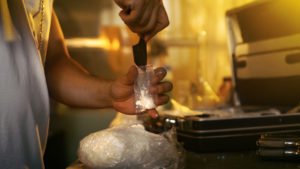
Florida is a state with one of the toughest sets of consequences for crimes involving illegal drugs across America. Furthermore, manufacturing a controlled substance with the intent to distribute is one of the most severely punished drug crimes. As such, if you have been accused and are facing these drug charges in Venice, you will need a criminal defense attorney with a wealth of experience and skill to help you avoid the worst punishments.
Drug crimes are particularly difficult due to the complexity of the laws surrounding controlled substances. Depending on the amount and type of a controlled substance in your possession, you will be facing a different level of charge with different consequences.
No matter what drug charges you are up against, the criminal defense attorneys at The Law Place can help you. To find out how you can benefit from our 75 combined years of criminal defense experience, arrange a free consultation today. Every free consultation is at no obligation and entirely protected by the confidentiality of the attorney-client relationship.
Help us to help you and apply for legal counsel by calling our office at (941) 444-4444, any time of the day or night.
How the Laws in the State of Florida Define Manufacturing a Controlled Substance
There are many different levels of drug charges possible under Florida law. The circumstances and boundaries for a charge of manufacturing a controlled substance with the intent to distribute are contained within Florida Statute 893.13.
This Florida statute states that you can receive a charge of this type if you are accused of partaking in any stage of the process of manufacturing illegal drugs. The Florida Drug Abuse Prevention and Control Act defines this as any person who – whether indirectly or directly – has contributed to the growing, cultivating, preparing, processing, converting, or compounding of a controlled substance.
This means that you can be charged with manufacturing with the intent to distribute if you are involved in the labeling, packaging, or repackaging process. It is also possible to receive charges of this type if you are found in possession of large amounts of specialist chemicals or the specific equipment used to manufacture a controlled substance.

The Consequences of Being Found Guilty in a Florida Court for Manufacturing a Controlled Substance
As we have already briefly mentioned, the exact punishment you can receive for manufacturing a controlled substance will depend on the type, schedule, and amount present of the drug in question. Generally speaking, the larger the amount of substance and the higher the schedule, the more severe the punishment.
However, there are many other intricacies that determine whether you are charged with simple possession, possession with intent to supply, drug manufacturing, or drug trafficking charges. As such, the best way to find out exactly what you will be up against in court is to contact a criminal defense attorney from The Law Place today.
We will talk you through exactly how the laws work for the crime you are accused of and show you the best legal process for getting your sentence reduced or even dismissed entirely.
 We’re here to serve you. Our phones are open 24 hours a day.
We’re here to serve you. Our phones are open 24 hours a day. Examples of Consequences for Various Drug Manufacturing Circumstances
While we cannot tell you exactly what the consequences for your specific drug crime will be, we can give you some examples to help you understand how the Florida state laws work in this regard.
We will use amounts of a controlled substance that can result in a second-degree felony charge as our example. The punishment for any of the following drug crime examples is a maximum of 15 years in prison and a fine that can go as high as $10,000:
- Up to 14 grams of methamphetamine.
- Up to 4 grams of opiates, such as heroin, hydrocodone, oxycodone, morphine, opium, and codeine.
- Up to 4 grams of Flunitrazepam, more commonly called Rohypnol or ‘roofies.’
- Up to a kilogram of Gamma-Hydroxybutyric Acid, which is also known by its street name GHB.
- Up to 28 grams of Phencyclidine, which is more commonly called PCP or angel dust.
As these examples show us, the boundaries for how much actual weight of a controlled substance will result in a second-degree felony charge varies wildly between substances.
Once these boundaries are exceeded for each controlled substance, the charges become even more severe. If you are found guilty of possession of more than these amounts, the charges become those of a first-degree felony.
As if this wasn’t enough, there are additional crimes involved in the manufacturing process for which you can be arrested and charged. Possession of specific chemicals known to be used in the manufacture of controlled substances may be punished with a separate second-degree felony charge.
Furthermore, other activities such as renting an area with the intention to use it to manufacture controlled substances can be punished with another separate third-degree felony charge.
As you can see, the Florida state laws surrounding drug crimes of this type are exceedingly complex and confusing. The best way to receive specific legal advice is to get in touch with the criminal defense attorney team at The Law Place and tell us about your case. You don’t need to worry about what you disclose, as your story will be fully protected by the attorney-client relationship of confidentiality.
 We’re Florida’s top litigation team with over 75 years of combined experience
We’re Florida’s top litigation team with over 75 years of combined experience Florida’s Five Drug Schedules Explained
We have previously mentioned that the punishment you can expect corresponds with the amount of controlled substances in your possession and the schedule of said substance.
But what is a drug schedule? In America, the government categorize each illegal drug and place it in one of five schedules, depending on their perception of its potential for harm and addiction.
Schedule I contains those controlled substances which are deemed to be the most dangerous and have the most addictive potential. Schedule V contains those drugs with the lowest potential for harm.
The following sections will give you a brief explanation of each schedule and examples of the substances that belong to them.
Schedule I Substances
These controlled substances are the ones that are at the top of the list for addiction, harm, and abuse potential in the eyes of the government.
These drugs generally also lack any accepted or mainstream use in the medical field.
Schedule I drugs include meth, heroin, and LSD.
Schedule II Substances
These drugs also carry a large risk of abuse, harm, and addiction in the eyes of America’s lawmakers. As such, possession of these drugs is still punished very severely.
However, the key difference between these drugs and those belonging to Schedule I is that drugs in Schedule II usually have an accepted use in mainstream medicine or science, which means that this category often also encompasses those prescription substances with a potential for abuse.
Schedule II drugs include Adderall, fentanyl, and oxycodone.
Schedule III Substances
The drugs belonging to this schedule represent the middle of what substances the government deems to be the most harmful, addictive, and open to abusive tendencies.
Schedule III includes controlled substances such as ketamine, steroids, and some products that contain codeine.
Schedule IV Substances
These drugs are deemed to be the second-lowest in terms of harm by the government but are still illegal to possess without a valid prescription and can land you a hefty fine and jail sentence if you are found guilty in a court of the law for possession, sale, or manufacture of them.
Schedule IV includes a number of commonly known prescription drugs such as Xanax, Valium, and Ambien.
Schedule V Substances
The last schedule contains those drugs which are deemed to be the ‘safest’ drugs in the eyes of the government, but make no mistake – they are still illegal and can result in a possession charge or more if found on your person without a valid prescription.
Schedule V includes substances such as Lyrica, Motfen, and Lomotil.
No matter which schedule of drug you have been charged with possession, possession with intent to sell, or the manufacturing of, you should take your case extremely seriously. Only with the help of a highly experienced criminal defense attorney can you hope to avoid the worst consequences of your accusation.
Don’t waste decades of your life, your potential, or your life savings – call a drug charge defense lawyer from The Law Place today and get the support of someone who will fight your charges tooth and nail.
 From the initial call to updates on your case status, we are here to get you answers.
From the initial call to updates on your case status, we are here to get you answers. What Are Mandatory Minimum Sentences and How Do They Work in Florida?
If you are charged with possession or manufacture with intent to sell a drug in Florida, you don’t only have to worry about the various complexities of the law – you also have to worry about mandatory minimum sentencing laws.
What these laws mean is that the judge in your court case will be absolutely unable to show discretion when it comes to the terms of your prison sentence. If you are facing a mandatory minimum prison sentence of five years, this will be the minimum of what you receive.
The only way your criminal defense attorney will be able to get your sentence lowered is by getting charges against you lowered in severity. For example, by getting your third-degree felony lowered to a first-degree misdemeanor. This is why it is so important to secure an appropriately skilled lawyer to represent your case.
For the best chance at getting your mandatory minimum sentence lowered, contact an attorney from The Law Place today.
What Types of Drug-Related Crimes Are Possible in the State of Florida?
It may be useful for you to be fully informed of the different potential types of drug crime possible under Florida law, as your attorney may be able to get your case lowered to one of these – or you could be charged with one alongside your accusation of drug manufacturing.
The different types of drug-related charges that it is possible for a person in the State of Florida to receive include:
- A simple possession charge.
- Possession of drug paraphernalia. A drug paraphernalia possession charge can be issued if you have any of the following found in your possession: instruments designed for the storage, delivery, concealment, delivery, sale, manufacture, production, transportation, delivery, planting, or cultivation of a controlled substance.
- The sale of a controlled substance.
- Drug possession with intent to sell.
- The manufacture of a controlled substance.
- Trafficking controlled substances.
Each of these drug possession-related crimes carries a heavy punishment under Florida law, but some are preferable to others.
It should also be noted that some crimes, such as possession of drug paraphernalia, can carry a maximum jail term of one year – even if there is no controlled substance on your person when you are arrested by law enforcement.
No matter which of these criminal charges you are up against, the legal team here at The Law Place can help you. We have experience fighting every type of drug charge, from possession of paraphernalia to distribution.
How Does the Court Decide Someone Is Guilty?
As any level of drug possession is dealt with using criminal law, the prosecution must prove guilt beyond a reasonable doubt.
There are three different things that need to be proven by the prosecution in order to result in a guilty charge. The burden of proof for these three things lies with the prosecution and the government. If they are unable to be proven, the charges held against you will be dropped or reduced. This is where your experienced criminal defense lawyer comes in.
These three things are the following:
- The person accused of the drug possession crimes was in actual possession of the substance, had the intent to sell the substance, and had either manufactured it or had the intention of manufacturing it.
- The substance in the possession of the accused was one of the illegal drugs covered in Florida Statute 893.13.
- The accused were entirely aware of the illegal nature of the substance in their possession.
There are a number of things that are usually used to demonstrate proof in cases such as these. For example:
- Large amounts of cash in the possession of the person accused of the offense. This cash does not have to be on the person of the defendant. It could also be stashed in their home, vehicle, or somewhere close to where the drugs themselves were located.
- Items commonly used for dealing drugs were located nearby to the drugs themselves. These items commonly include baggies, scales, or other drug packaging equipment.
- Weapons were found in the possession of the defendant.
- Law enforcement was previously informed by people involved with or associated with the accused that they had the intent to sell controlled substances.
- The amount of the controlled substance involved in the drug possession charge demonstrated intent to sell.
No matter what your situation, from possession of 10 grams marijuana to 30 grams of heroin, you stand a better chance of avoiding the worst consequences for your offense with the help of an attorney.
You can find attorneys with a thorough knowledge of criminal and drug laws at The Law Place. We pride ourselves on approaching every client on a case-by-case basis and composing the most rigorous and effective defense for their personal situation.
For more information and free, impartial legal advice from a qualified attorney – get in touch with our office today.
What Are Some Common Defenses Used by Attorneys in Drug Manufacture Cases?
As cases involving drugs are common, there are a large number of established precedents when it comes to getting the charges leveled against you either lowered or dismissed.
An attorney from The Law Place will use a combination of the elements of these that suit your circumstances the best but will also tailor your defense to your specific circumstances.
Common defense precedents for this type of drugs charge include:
- The weight of the drug was miscalculated, and therefore impacts the boundaries of the charges.
- Evidence essential to proving the defendant guilty was obtained illegally, improperly, or without a valid warrant – making it inadmissible in court.
- The defendant is, in fact, a misidentified suspect and is not guilty of any drug crime.
- The process used to identity the drug was improper or flawed in some way.
- Entrapment was used in the arrest of the defendant.
If you call today for a free case evaluation, we can let you know the best plan for your case going forward. Even if we cannot get your charges dropped entirely, getting them reduced can still greatly impact your future.
The Main Difference Between a Felony Charge and a Misdemeanor
When it comes to drug charges, it is likely that the charge could quickly tip over into felony territory. This is to be avoided at all costs, and a criminal lawyer is the best way to do this.
Unlike a misdemeanor charge, a felony charge represents a permanent stain on your criminal record that will follow you for the rest of your life without the hope of it being removed.
With a felony on your record, you will automatically become less competitive in the employment market. Future employers will always be able to see the drug charge before they decide to employ you.
It will also become more difficult to complete responsibilities that require a level of trust or a background check, such as receiving credit, a mortgage, certain types of licenses, etc.
That is not all. A felony charge can continue to handicap you in with family law and can be a huge problem in custody battles.
A felony charge cannot ever be legally sealed or expunged, whereas a misdemeanor can be in some circumstances.
Contact The Law Place Today
If you have been accused of the manufacture of illegal drugs in the State of Florida, we can help you to avoid the worst consequences as much as possible. The more time you give our experienced team to work on your case, the more rigorously we can formulate your defense.
It all starts with a free consultation over the telephone with a member of our team. The conversation will be entirely confidential and at no obligation but will show you the path available to you moving forwards. We could help reduce the mandatory minimum prison sentence, get your felony downgraded to a misdemeanor, or get the charges leveled against you dropped entirely. We will also be able to work together to formulate a payment plan which works for you, as nobody should be left without top-notch legal defense due to their budget.
For more information on how a member of our highly experienced team of criminal defense lawyers can help you, call our legal office on (941) 444-4444. We operate our lines constantly for the benefit of your busy schedule.



